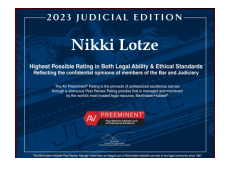At Lotze Mosley LLP, our criminal defense attorneys in Washington D.C. and Maryland advise our residents to pursue legal representation if law enforcement is acting under the authority of a bench warrant, arrest warrant, or material witness warrant, but few people know the difference between the three and what they mean to your freedom.
Bench Warrants
A bench warrant is issued by a judge and is a legal document authorizing a person’s arrest.
A bench warrant is usually issued when a person:
- Fails to appear to a mandatory hearing
- Violates their conditions of release
- Disregards some other type of court order
Once the warrant is issued, the person is subject to arrest.
Law enforcement officials apply for the warrant as an order to bring the defendant back in front of the judge.
Arrest Warrants
An arrest warrant is a legal document issued by a neutral magistrate or judge that authorizes:
An arrest warrant requires probable cause to arrest and detain an individual or the search and seizure of an individual’s property.
The arrest warrant must specifically identify the person to be arrested or the exact property to be searched.
Material Witness Warrants
The third type of warrant is called a material witness warrant.
If someone is subpoenaed to the Grand Jury, D.C. criminal law considers them a “material witness.”
The prosecutor’s office can ask a judge to authorize the arrest of a reluctant witness, so the State can secure the evidence they need to move forward with their case.
The most common reasons for not cooperating with the prosecutor’s office can include:
- Afraid of getting involved
- Angry for being singled out
- Guilty of something
- Irritated about having to participate in an investigation
- Reluctant to inform on work colleagues or friends
- Worried about the potential for retaliation
When witnesses refuse to cooperate, they can face charges of obstruction of justice, which is why it is important to contact a Washington, DC criminal defense attorney before responding to any type of warrant.
As a material witness, you have rights.
Including:
- The right to know the nature and target of the investigation
- The Fifth Amendment right against self-incrimination
- The right to have an attorney
Call Us Now
If an arrest, bench, or material witness warrant has been authorized for your retention in Washington D.C. or Maryland, contact our Washington, DC criminal defense attorneys at Lotze Mosley, LLP today by calling (202) 393-0535 to understand your rights, so you can respond with legal representation by your side.













